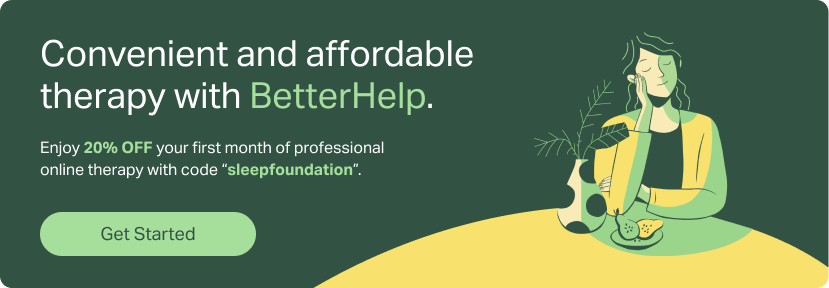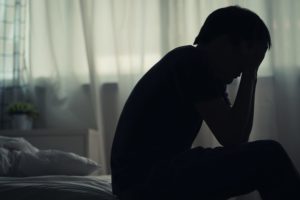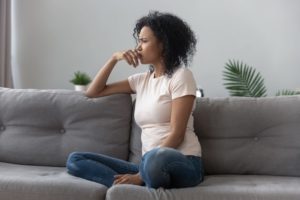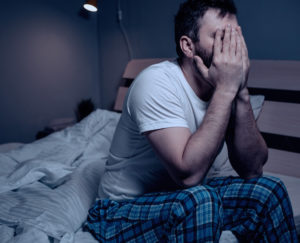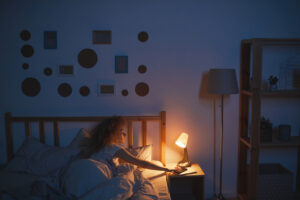When you buy through our links, we may earn a commission. Products or services may be offered by an affiliated entity. Learn more.
The Relationship Between Anxiety and Insomnia
Stress and anxiety are closely associated with insomnia. People with anxiety disorders may have difficulty falling asleep and staying asleep. And people with insomnia often have increased anxiety, which creates a cycle of sleeplessness. Both anxiety and insomnia take a toll on a person’s daily activities.
Everyone has feelings of nervousness and worry at times, just as everyone sometimes has trouble sleeping. But when these feelings persist, disrupting both sleep and daily life, they may be signs of a disorder.
Can Anxiety Cause Insomnia?
Most people diagnosed with an anxiety disorder also experience sleep disturbances because anxiety at night can lead to insomnia. Health care providers frequently ask people with anxiety disorders about symptoms of insomnia, since the two disorders are closely linked to one another.
“Anxiety and insomnia are best friends, and when you experience one, you are most likely to experience the other.”
Dr. Abhinav Singh, Sleep Physician
A heightened state of alertness, known as hyperarousal, links anxiety to sleep problems. People with anxiety disorders often find themselves in this state . They may also experience:
A heightened state of alertness, known as hyperarousal, links anxiety to sleep problems. People with anxiety disorders often find themselves in this state . They may also experience:
- Worry about daily life, stressful events, or getting enough sleep
- Restlessness
- Irritability
- Fatigue
- Muscle tension
- Poor concentration
- Difficulty getting to sleep or waking too early
And with insomnia, hyperarousal extends into the nighttime, making it tough to fall asleep and not wake up during the night.
Effects of Anxiety-Induced Insomnia
People with anxiety disorders frequently have a hard time falling asleep at night. But studies show that people with anxiety-induced insomnia have the most trouble staying asleep , leading to a shorter night’s rest. And anxiety often accompanies nightmares, which can cause poor sleep and contribute to insomnia.
People with insomnia tend to have symptoms during the daytime as well, including:
- Feeling unrested and sleepy during the day
- Reduced focus and concentration at work or school
- Increased risk of mistakes or accidents
- Decreased motivation
- Worry or frustration about sleep
- Feeling irritable or depressed

Can Insomnia Cause Anxiety?
Studies show that not sleeping spurs anxious feelings and may result in anxiety disorders . The lack of sleep caused by insomnia often leads people to worry about inadequate sleep and its effect on their daily lives. For some people, their worries get worse as bedtime approaches.
Specifically, the chronic sleep debt caused by insomnia may lead to elevated levels of cortisol , a stress hormone associated with anxiety. And the anxiety about the inability to sleep creates a disruptive sleep cycle.
Effects of Insomnia on Mental Health
Just as anxiety can cause insomnia, not being able to sleep can cause worry and stress. This loop of anxiety and insomnia may worsen over time, resulting in mental health conditions such as depression.
Getting poor sleep as a result of insomnia potentially impacts both physical and mental health. People with chronic sleep debt often show signs of depression and anxiety, including irritability and poor mood. Research shows that a lack of sleep enhances negative emotions , while getting enough sleep each night helps regulate these feelings.
How to Tell Anxiety and Insomnia Apart
Determining whether anxiety or insomnia is the root problem can be difficult, since people can experience anxiety before, during, or after insomnia. Among people whose anxiety stems from insomnia, their worries focus specifically on the problems they have with sleep.
But those whose worries persist, and who feel anxious about all the stressors in their lives beyond sleep issues, should consider talking to their doctors about anxiety disorders. A doctor can help identify the causes of anxiety and sleep difficulties while offering guidance on different treatment options.
How to Beat Insomnia and Anxiety
Improving sleep quality can result in better mental health, including a reduction in anxiety. Similarly, treating anxiety may improve the symptoms of insomnia.
People with insomnia and anxiety often use behavioral changes to control their symptoms. Effective talk therapy and medical treatments can also address these symptoms at the same time.
Cognitive Behavioral Therapy
Cognitive behavioral therapy (CBT) treats both anxiety and insomnia. CBT for insomnia (CBT-I) aims to identify which behaviors specifically lead to sleep loss. CBT for anxiety works by helping people think about and approach situations in their life differently to worry less. Your doctor can help you decide if CBT fits your needs.
Medication for Anxiety and Insomnia
Health professionals may recommend several types of medications to treat anxiety and insomnia. The choice of medications is informed by a person’s medical history, as well as their personal preferences.
To treat anxiety, health care providers may first recommend a selective serotonin reuptake inhibitor (SSRI) or a serotonin-norepinephrine reuptake inhibitor (SNRI). But these drugs can sometimes increase a person’s energy level and make their insomnia symptoms worse. Their doctor may prescribe a medication to be taken in the morning or choose one that induces sleep.
For people with insomnia, doctors typically use an integrated approach that includes sleep aids like prescription drugs, over-the-counter medication, or melatonin, along with sleep hygiene and CBT-I. These medications can help people feel sleepy, shorten the time it takes them to fall asleep, and/or improve the length and quality of their sleep.
Medications for anxiety and insomnia help relieve the symptoms of these disorders, but they must be taken regularly to work effectively. Talking to a doctor can help you learn which medications might work best, and most safely, for you.
Improve Your Sleep Hygiene
When trying to overcome sleeping problems associated with anxiety or insomnia, improve your sleep hygiene with healthy sleep habits, including:
- Keeping the same sleep schedule
- Turning down the lights
- Avoiding technology use before bed
- Taking time to relax with a bath or a book
- Budgeting enough time for sleep
- Cutting out caffeine and alcohol in the hours leading up to bedtime
- Exercising during the day
Although these sleep tips may not directly address anxiety and insomnia, attending to your sleep hygiene can increase the quality of your sleep.

Still have questions? Ask our community!
Join our Sleep Care Community — a trusted hub of sleep health professionals, product specialists, and people just like you. Whether you need expert sleep advice for your insomnia or you’re searching for the perfect mattress, we’ve got you covered. Get personalized guidance from the experts who know sleep best.
Medical Disclaimer: The content on this page should not be taken as medical advice or used as a recommendation for any specific treatment or medication. Always consult your doctor before taking a new medication or changing your current treatment.
References
6 Sources
-
Baldwin, D. (2022, April 18). Generalized anxiety disorder in adults: Epidemiology, pathogenesis, clinical manifestations, course, assessment, and diagnosis. In M.B. Stein (Ed.). UpToDate.
https://www.uptodate.com/contents/generalized-anxiety-disorder-in-adults-epidemiology-pathogenesis-clinical-manifestations-course-assessment-and-diagnosis -
Staner, L. (2003). Sleep and anxiety disorders. Dialogues in Clinical Neuroscience, 5(3), 249–258.
https://pubmed.ncbi.nlm.nih.gov/22033804/ -
Neckelmann, D., Mykletun, A., & Dahl, A. A. (2007). Chronic insomnia as a risk factor for developing anxiety and depression. Sleep, 30(7), 873–880.
https://pubmed.ncbi.nlm.nih.gov/17682658/ -
Hanson, J. A., & Huecker, M. R. (2022, September 9). Sleep deprivation. In StatPearls. StatPearls Publishing.
https://www.ncbi.nlm.nih.gov/books/NBK547676/ -
Vandekerckhove, M., & Wang, Y. L. (2017). Emotion, emotion regulation and sleep: An intimate relationship. AIMS Neuroscience, 5(1), 1–17.
https://pubmed.ncbi.nlm.nih.gov/32341948/ -
Craske, M., & Bystritsky, A. (2021, November 12). Generalized anxiety disorder in adults: Management. In M. B. Stein (Ed.). UpToDate.
https://www.uptodate.com/contents/generalized-anxiety-disorder-in-adults-management


